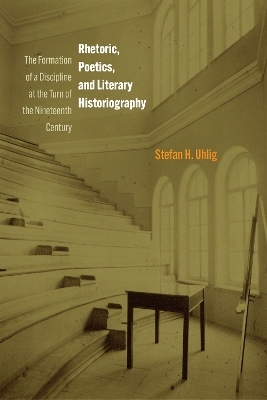
Rhetoric, Poetics, and Literary Historiography
The Formation of a Discipline at the Turn of the Nineteenth Century
Seiten
2024
University of Pennsylvania Press (Verlag)
978-1-5128-2415-5 (ISBN)
University of Pennsylvania Press (Verlag)
978-1-5128-2415-5 (ISBN)
In Rhetoric, Poetics, and Literary Historiography, Stefan H. Uhlig offers a new account of the emergence of literary studies. Most histories of the early years of the field search for unifying origins of literature as a discipline and object of study. Uhlig turns to the decades around 1800 in Europe to reveal that the inception of the literary field was instead defined by intellectual diversity and contestation. He draws on an array of European writers to show how three schools of literary study—rhetoric teaching, theories of poetry, and literary history—emerged and clashed during this time, offering near-contemporaneous, yet divergent, visions of how to understand literature. Rhetoric and poetics thwarted criticism, to different ends, while literary historiography proved institutionally reassuring yet less useful as a tool for textual understanding.
Uhlig details how Scottish writers like Adam Smith and Hugh Blair taught rhetoric as a form self-expression, while Anglophone and German theorists of poetry like William Wordsworth, Friedrich Schlegel, and Johann Wolfgang von Goethe both engaged with and resented critics. At the same time, varying opinions on the practice of literary history emerged, with Immanuel Kant and Thomas De Quincey arguing for the independence of literature from historical forces while writers like Matthew Arnold approached literature as a means of narrating cultural archives instead of drawing on close reading and analysis. Rhetoric, Poetics, and Literary Historiography traces current debates in literary studies back to this formative moment, serving as a guide to past and present controversies in the field.
Uhlig details how Scottish writers like Adam Smith and Hugh Blair taught rhetoric as a form self-expression, while Anglophone and German theorists of poetry like William Wordsworth, Friedrich Schlegel, and Johann Wolfgang von Goethe both engaged with and resented critics. At the same time, varying opinions on the practice of literary history emerged, with Immanuel Kant and Thomas De Quincey arguing for the independence of literature from historical forces while writers like Matthew Arnold approached literature as a means of narrating cultural archives instead of drawing on close reading and analysis. Rhetoric, Poetics, and Literary Historiography traces current debates in literary studies back to this formative moment, serving as a guide to past and present controversies in the field.
Stefan H. Uhlig is Associate Professor of Comparative Literature at the University of California, Davis.
Introduction
Chapter 1. Smith Against Interpretation
Chapter 2. Blair’s Indiscipline
Chapter 3. Anticriticism in Wordsworth, Coleridge, and Hazlitt
Chapter 4. Muted Poetics in Schlegel and Goethe
Chapter 5. The Rise of the Archive
Chapter 6. Thinking with Literature: Kant, Arnold, De Quincey, Goethe
Notes
Bibliography
Index
Acknowledgments
| Erscheinungsdatum | 26.12.2023 |
|---|---|
| Verlagsort | Pennsylvania |
| Sprache | englisch |
| Maße | 152 x 229 mm |
| Themenwelt | Geisteswissenschaften ► Sprach- / Literaturwissenschaft ► Anglistik / Amerikanistik |
| Geisteswissenschaften ► Sprach- / Literaturwissenschaft ► Literaturgeschichte | |
| Geisteswissenschaften ► Sprach- / Literaturwissenschaft ► Literaturwissenschaft | |
| Geisteswissenschaften ► Sprach- / Literaturwissenschaft ► Sprachwissenschaft | |
| ISBN-10 | 1-5128-2415-1 / 1512824151 |
| ISBN-13 | 978-1-5128-2415-5 / 9781512824155 |
| Zustand | Neuware |
| Informationen gemäß Produktsicherheitsverordnung (GPSR) | |
| Haben Sie eine Frage zum Produkt? |
Mehr entdecken
aus dem Bereich
aus dem Bereich
Poetik eines sozialen Urteils
Buch | Hardcover (2023)
De Gruyter (Verlag)
CHF 83,90
Buch | Softcover (2024)
belleville (Verlag)
CHF 27,95


